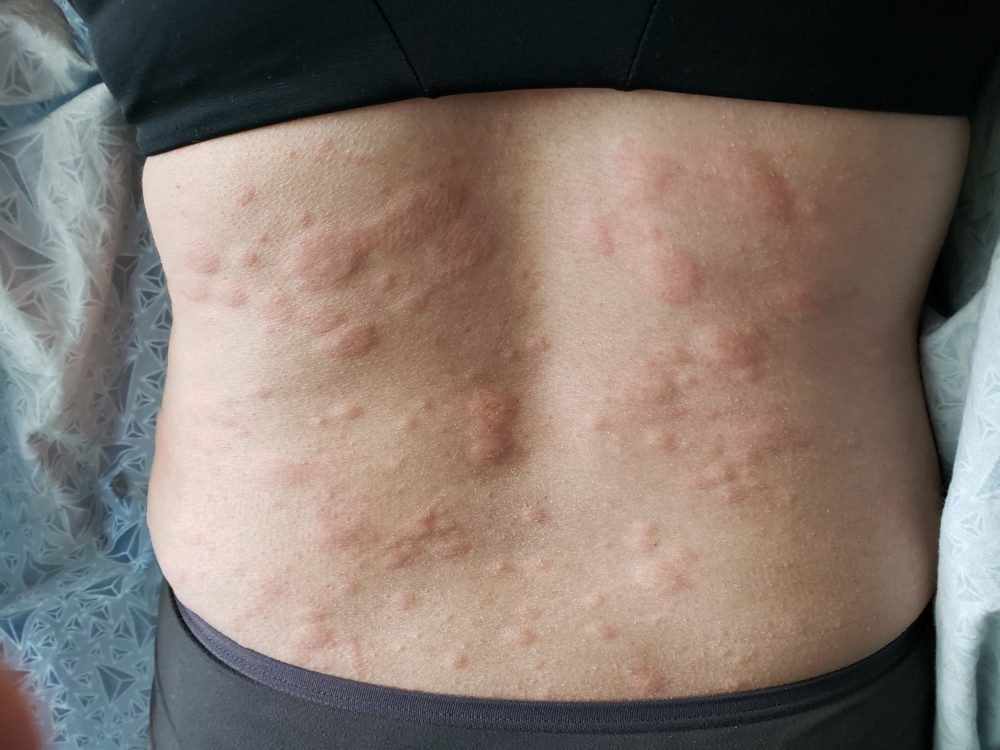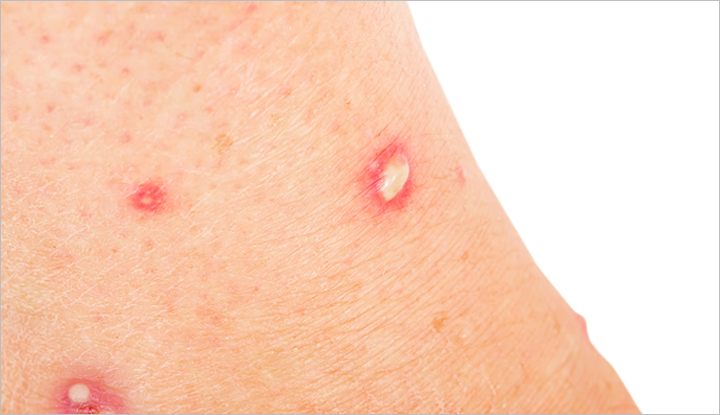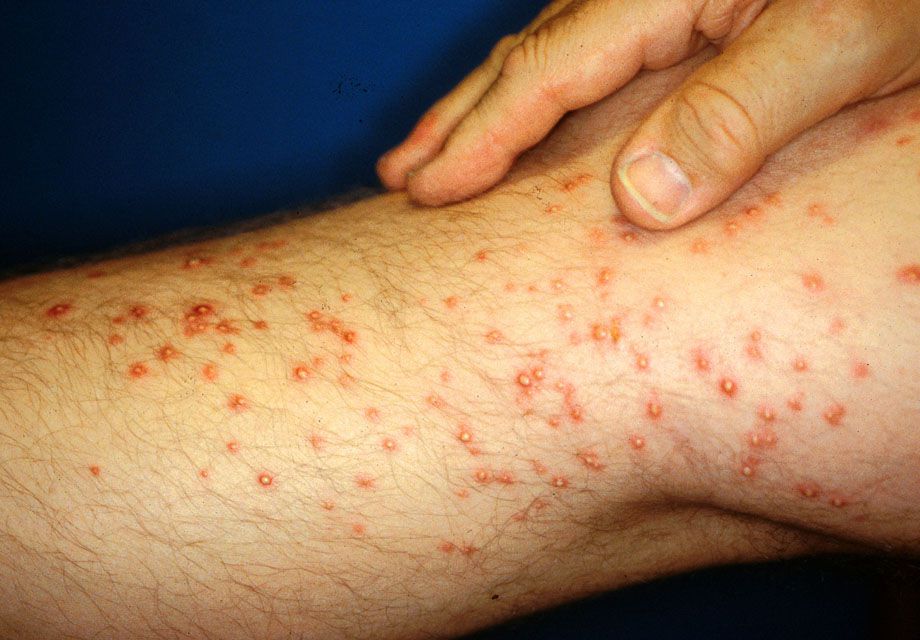Yes, ants can cause hives through bites and stings. These insects release venom, triggering allergic reactions.
Ants are a common pest that can disrupt your daily life. Not only can they invade your home, but they can also cause problems for your health. Ants have the potential to cause hives through their bites and stings, particularly if you have an allergy to their venom.
Understanding the symptoms and treatment options for ant-related hives is essential for managing these reactions effectively. We will explore how ants can cause hives, the signs to watch out for, and what you can do to prevent and treat these allergic reactions. By the end, you’ll have a better understanding of how to handle ant-induced hives and keep yourself safe from these pesky insects.
Are Ants Causing Your Hives?
Are Ants Causing Your Hives?
Are you noticing mysterious hives on your skin without any apparent cause? Ants may be the surprising culprit behind your hives. Discover how different types of ants, their bites and stings, and potential allergic reactions could be leading to your skin irritation.
Fire ants, black ants, and red weaver ants are among the common ant species known to cause skin reactions in some individuals. Their bites or stings often result in red, itchy hives that can be distressing and uncomfortable.
Ant bites and stings can be painful and may lead to the development of hives around the affected area. When an ant bites or stings, it injects venom or formic acid into the skin, triggering an immune reaction that often results in the characteristic raised red welts associated with hives.
Allergic reactions to ant venom can range from mild itching and swelling to severe symptoms such as respiratory distress, dizziness, and fainting. If you suspect you may be allergic to ant bites or stings, it is crucial to seek medical attention to prevent serious complications.

Credit: pharmaceutical-journal.com
Types Of Ants
Ants come in various types, each with its distinctive characteristics and behavior.
Common Ant Species
- Fire ants
- Carpenter ants
- Pharaoh ants
Behavior And Habitats
Ants exhibit diverse behaviors and dwell in different habitats according to their species.
| Ant Species | Behavior | Habitats |
|---|---|---|
| Fire ants | Aggressive, sting when provoked | Warm climates, prefer open areas |
| Carpenter ants | Build nests in wood, not aggressive | Moist wood structures |
| Pharaoh ants | Small, infest homes, hospitals | Warm, humid environments |
Ant Bites And Stings
Ants are tiny creatures that can pack a big punch, especially when it comes to causing hives on your skin. One common way ants can cause hives is through their bites and stings. Here, we delve into the details of ant bites and stings – from identifying them to understanding the symptoms and reactions, as well as exploring the available treatment options.
Identifying Ant Bites
- Look for red, swollen, and itchy areas on your skin.
- Ant bites tend to leave small puncture marks.
- Some ants release formic acid when they bite, causing a burning sensation.
Symptoms And Reactions
- Redness: Skin may turn red or develop a raised bump.
- Swelling: Area around the bite/sting may swell and feel warm.
- Itching: The affected area can be intensely itchy.
- Pain: Ant bites can be painful, especially when stung by certain species.
Treatment Options
| Treatment | Description |
|---|---|
| Wash the Area | Use soap and water to clean the bite/sting area. |
| Cold Compress | Apply a cold compress to reduce swelling and ease itching. |
| Antihistamines | Take oral antihistamines to alleviate itching and redness. |
| Topical Creams | Use topical creams with corticosteroids to reduce inflammation. |
Allergic Reactions
Allergic reactions to ants can result in hives, a common skin condition characterized by red, itchy welts. Ant bites can trigger an immune response leading to hives in sensitive individuals. It is essential to seek medical attention if experiencing severe reactions.
Allergic reactions to ant bites can cause hives, itching, and swelling in some individuals, leading to discomfort and potential health risks. Understanding the signs and symptoms of such allergic reactions is crucial in managing and seeking prompt medical attention when necessary.
Understanding Allergies To Ant Bites
Ants can provoke allergic reactions in some people due to the venom they inject while biting or stinging. This venom contains proteins that trigger an immune system response, leading to allergic symptoms, such as hives, swelling, itching, and in severe cases, anaphylaxis. Understanding the specific allergens and their effects is essential in preparing for potential encounters with ants.
Signs And Symptoms Of Allergic Reactions
Individuals allergic to ant bites may experience red, itchy welts on their skin within minutes of being bitten. These welts can develop into raised bumps or hives, and the affected area may swell and become painful. In some cases, individuals may also experience difficulty breathing, dizziness, and a rapid drop in blood pressure, indicating a severe allergic reaction that requires immediate medical attention.
Seeking Medical Attention
Upon recognizing allergic symptoms to ant bites, it’s crucial to seek immediate medical attention. Those with a history of severe allergic reactions should carry an epinephrine auto-injector at all times and use it as directed by their healthcare provider in the event of an emergency.
By being aware of the signs and symptoms of allergic reactions to ant bites, individuals can take proactive measures to manage potential encounters and seek appropriate medical attention when necessary.
Preventing Ant Bites And Hives
Ants are tiny insects that may seem harmless, but their bites can cause irritation and even lead to hives for some individuals. It is essential to take preventive measures to keep ants away and protect yourself from their bites. Whether you’re indoors or outdoors, these simple steps can help you avoid ant bites and the uncomfortable symptoms of hives.
Keeping Your Living Space Ant-free
Your home should be a safe haven, free from ants and other unwelcome pests. By following these tips, you can create an ant-free environment:
- Keep it clean: Ants are attracted to food particles and crumbs, so regularly clean your living space and kitchen. Wipe down countertops, sweep floors, and vacuum carpets to eliminate any potential food sources.
- Seal entry points: Ants can find their way into your home through the tiniest cracks and crevices. Seal any openings around windows, doors, and utility lines using caulk or weatherstripping. This will make it harder for ants to infiltrate your living space.
- Store food properly: Keep all food stored in airtight containers to prevent ants from being attracted to them. This includes pantry items, pet food, and even fruits on countertops.
- Try natural deterrents: Ants dislike certain scents, such as peppermint, cinnamon, and citrus. Use essential oils or create homemade repellents to discourage ants from entering your home. Place these deterrents near entry points or areas where ants tend to gather.
Protective Measures When Outdoors
Spending time outdoors can expose you to more ant encounters. Follow these measures to reduce the risk of ant bites and hives:
- Wear closed-toe shoes: When walking in areas where ants may be present, it’s best to wear closed-toe shoes to protect your feet from bites. Avoid sandals or flip-flops that make you more susceptible to ant encounters.
- Use insect repellent: Applying insect repellent to exposed skin can help deter ants from biting you. Look for products containing DEET or other recommended repellents for maximum effectiveness.
- Avoid ant nests: Educate yourself about the types of ants common in your area and their nesting behaviors. Steer clear of ant mounds or nests to minimize the chances of getting bitten.
- Cover food and drinks: When having picnics or outdoor meals, keep food and drinks covered to prevent ants from being attracted to them. An uncovered snack can quickly become an invitation for ants to join in.
By implementing these preventive measures both indoors and outdoors, you can significantly reduce the risk of ant bites and hives. Remember that awareness and proactive actions are key to keeping ants at bay, ensuring that you can enjoy your surroundings without worrying about itchy bites or unsightly hives.

Credit: my.clevelandclinic.org
Natural Remedies For Ant Bites And Hives
Ant bites can be painful and itchy, and in some cases, they can even cause hives. If you’re dealing with ant bites and hives, there are natural remedies that can help alleviate the discomfort and promote healing. In this blog post, we’ll discuss some effective home remedies for soothing ant bites and managing hives caused by ant bites. So, let’s dive in and explore these remedies that can bring relief to your skin.
Home Remedies For Soothing Bites
Dealing with ant bites can be quite frustrating, but there are several home remedies that can help soothe the itchiness and pain. Here are some simple yet effective remedies:
- Create a paste using baking soda and water, and apply it directly to the affected area. The alkaline properties of baking soda can help neutralize the venom and reduce itching.
- Apply a cold compress or an ice pack to the affected area for 10-15 minutes. This can help reduce swelling and numb the area, providing temporary relief.
- Aloe vera gel is known for its soothing properties. Apply a small amount of aloe vera gel to the ant bite to reduce irritation and promote healing.
- If the itching is unbearable, you can try applying a small amount of honey to the bite. Honey has natural antibacterial properties and can help reduce inflammation.
Allergy Management Tips
In some cases, ant bites can trigger an allergic reaction, leading to hives. If you or someone you know experiences hives due to ant bites, it’s important to manage the allergy effectively. Here are some tips:
- Avoid scratching the hives, as this can worsen the symptoms and lead to further irritation.
- Apply a cold compress to the affected area to relieve itching and reduce swelling.
- Take an antihistamine medication as directed by a healthcare professional to reduce the allergic reaction and alleviate symptoms.
- If the hives persist or worsen, seek medical attention immediately to ensure proper diagnosis and treatment.
By following these simple home remedies for soothing ant bites and managing hives caused by ant bites, you can find relief from the discomfort and promote healing. Remember, it’s important to consult a healthcare professional if the symptoms worsen or persist. Take care of your skin and protect yourself from ant bites by keeping your surroundings clean and using repellents if necessary.
When To Consult A Professional
It’s essential to be aware of the signs that indicate you might need to consult a professional for ant-related hives and allergic symptoms. Persistent hives and allergic symptoms can signal a need for professional intervention. Identifying ant infestations is crucial in determining the appropriate actions to take to address any potential health concerns.
Persistent Hives And Allergic Symptoms
Persistent hives and allergic symptoms such as difficulty breathing or swelling should prompt you to seek professional assistance. These symptoms may indicate a severe allergic reaction to ant bites, necessitating prompt medical attention. It’s vital to monitor any adverse reactions and seek medical help if symptoms persist or worsen.
Identifying Ant Infestations
Identifying ant infestations early on is crucial for preventing and addressing potential health risks. Look for trails of ants, nesting locations, or visible ants crawling on surfaces in and around your living spaces. If you suspect an ant infestation, it’s wise to consult a professional to address the issue effectively and minimize any potential health threats.
Frequently Asked Questions On Can Ants Cause Hives
Can Ants Cause Hives?
Ants are unlikely to cause hives directly. However, some people can have an allergic reaction to ant bites or stings, which may result in hives. If you develop hives after an ant encounter, it’s best to seek medical advice to determine the cause and get appropriate treatment.
Are Ant Bites Dangerous?
Most ant bites are not dangerous and cause only minor irritation, itchiness, or discomfort. However, some ant species, such as fire ants, can deliver painful bites that may lead to allergic reactions, infections, or severe allergic reactions known as anaphylaxis in rare cases.
If you experience severe symptoms after an ant bite, seek medical help immediately.
How Can I Prevent Ant Bites?
To prevent ant bites, take some precautions. Keep your surroundings clean, ensuring no food or sweet substances are left out. Seal any cracks or crevices ants can enter from, and use barriers such as cinnamon or vinegar to deter them.
If you spend time outdoors, wear protective clothing and use insect repellent to minimize your risk of ant bites.
Conclusion
Understanding the relationship between ants and hives is crucial for effectively managing hives. By identifying and preventing ant infestations, you can reduce the risk of hives. Implementing integrated pest management strategies can help control both ants and hives, creating a safer and healthier environment.

I’m MD Tanvir, and I bring years of expertise gained from working closely with pest control companies to the forefront. My journey in the industry has inspired me to launch Bug Battler, a platform aimed at equipping people with the know-how to combat pests autonomously. Through Bug Battler, I aim to empower individuals with practical insights to tackle pest infestations effectively.

